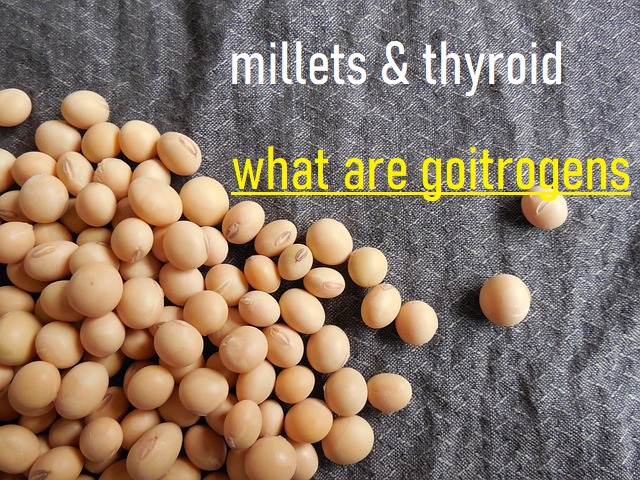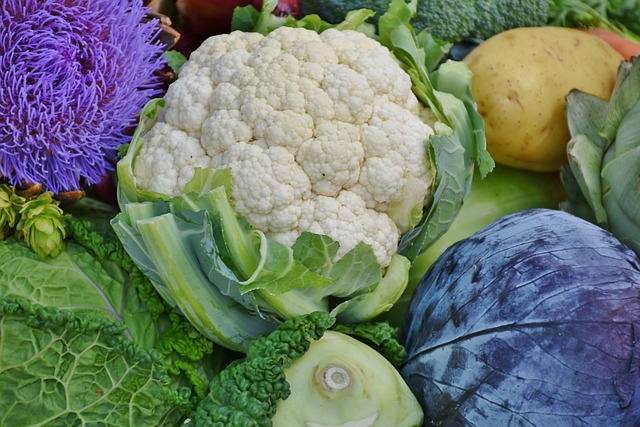About 300 million people have a thyroid dysfunction problem all over the world, with 42 million being Indians!
Despite iodine sufficiency, prevalence of thyroid dysfunction has not reduced.
What is the reason?
- thyroid auto-immune disease
- other goitrogens
What are Goitrogens
Goitrogens are dietary substances. This means they are sourced from food. But their disadvantage is that they can interfere with thyroid metabolism. Unfortuntaely, for thyroid patients, too much of goitrogens in diet can aggravate the thyroid dysfunction and iodine deficiency.
Are millets for thyroid bad?
Okay so millets are nutrien dense, loaded with fiber, protein, minerals, and amino acids. But can a thyroid patient have millets? Well, some millets, particularly bajra or pearl millet, sorghum or jowar , have goitrogen properties. This means that they disrupt the production of thyroid hormones.
when this happens, thyroid gland produces more tsh or thyroid stimulating hormone. as a result, there is growth of thyroid tissue. The person may eventually suffer from goiter.
why are goitrogens bad for thyroid?
Even at low levels, goitrogens affect the thyroid gland's functioning, reducing the uptake of iodine. But supplementing your diet with iodine can help offset this effect.
But if your diet includes a lot of goitrogens, it can impair the function of the thyroid gland, thus affecting the incorporation of iodine into thyroid hormone. as a result, the thyroid gland fails to utilize dietary iodine.
why is soy bad for thyroid?
Soy or soy-enriched foods are blamed for their role in aggravating thyroid problems. RESEARCH links soy products to reduced T4 absorption. It is to be believed that soy interferes with thyroid hormone action and may raise the risk of auto-immune thyroid.
Cooking reduces the goitrogenic content of foods. If you eat a lot of cruciferous vegetables, it's better to steam crucifers to reduce goitrogens.
is green tea good for thyroid?
one cup is okay but increased consumption of green tea leaves can affect thyroid function adversely.
Research finds decreased levels of T3 and T4 and increase in TSH after consumption of green tea extracts in high doses.
A little about thyroid gland
Pituatary gland produces TSH, which controls thyroxine, calcitonin, and tri-iodinethyronine.
What is responsible for the production of t3 and t4?
iodine in sea food and iodized salt contributed to the production of t3 and t4
when you consume iodized foods, iodine sourced from food starts circulating in the bloodstream as iodide (I). then it enters thyroid follicular cells via sodium-iodine symporter regulated by the TSH, which stimulates the production of thyroglobulin.
TPO or thyroid peroxidase enzyme oxidizes iodide in the cell. Following this, it undergoes the process of organification, thus producing two residues in the form of monoiodotyrosine and diiodotyrosine, which form T4 and T3.
Now the role of TSH begins, which stimulates thyroglobulin proteolysis. As a result, T3 and T4 hormones are released into the bloodstream.
deficiency of enzymes that help synthesis of thyroid hormone may result in goitre, ultimately leading to hypothyroidism.
Millets and thyroid
Can thyroid patients have millets? only in moderation
Why thyroid patients Cannot eat millets?
Some millets, especially bajra and sorghum, have goitrogenic properties and affect the function of thyroid gland. Excessive consumption of bajra and jowar can reduce t3 and t4 further and raise the levels of tsh.
Is ragi not good for thyroid?
Only in limited amount
क्या थायराइड के मरीज बाजरा खा सकते हैं?
Only occasionally
Role of Millet:
Various lab studies reveal that millet diets containing C-glycosylflavones produce effects similar to methimazole - anti-thyroid drug.
Millets affect thyroid function more in people who consume millet bran.
Thyroid diet
Patients suffering from hypothyroidism should avoid raw cruciferous veggies, including cauliflower, cabbage, broccoli, Brussels sprouts, mustard greens, turnip, and kale.
5 Facts about thyroid
Cooked cruciferous vegetables do not pose a high risk to thyroid patients.
Include thyroid-boosting foods in your daily diet.
They include foods rich in iodine, selenium, magnesium, zinc, iron, and copper.
Amino acid tyrosine is good for thyroid patients.
B2, B3, B6 vitamins are a must for those suffering from a thyroid disorder so is vitamin C and E.
Goitrogens, such as soy and cruciferous vegetables, are blamed for inhibiting the synthesis of thyroid hormones in numerous ways, particularly by blocking the utilization of iodine by the gland.
Opt for a balanced diet, which includes whole grains, healthy fats, and millets.
which millet is not good for thyroid
bajra, jowar (eat in moderation for a balanced diet); excessive consumption may cause thyroid problems.
is foxtail millet good for thyroid
yes
is barnyard millet good for thyroid patients
yes
is ragi good for thyroid
yes in moderation
is little millet for thyroid good?
it's the best millet for hypothyroidism
how to reduce goitrogens in millet?
soaking, sprouting, germinating, steaming, and cooking
a note of caution
High iodine intake can also have an antithyroid effect. An intake of 2.0 mg of iodide per day can impair the synthesis of thyroid hormone, resulting in lower levels of plasma T4 and T3. The thyroid gland enlarges in response, producing goiter. This problem occurs in Japan, where large amounts of iodine are consumed in the form of seaweed. The daily consumption of seaweed soup can supply 80 to 200 mg iodine per day, causing “iodine goiter” in children and adults. (sciencedirect)
What to eat in thyroid disorder?
Studies reveal that some specific ingredients must be part of the thyroid diet.
- vitamins A, B, C, and D, melatonin
- Omega 3 fatty acids
- phytochemicals and antioxidants
A healthy diet comprising the above can help
- reduce inflammation of thyroid gland
- suppress degradation of thyroid gland
- improve overall quality of life
Foods rich in selenium are excellent for thyroid function:
- cashew nuts
- brazil nuts
- walnuts
- almonds
- pumpkin seeds
- peanuts
- chia seeds
- sunflower seeds
- egg
- fatty fish
- flaxseeds
Role of selenium
- Selenium prevents cell damage.
- Improves thyroid health
- helps thryoid metabolism
- Boosts functioning of the immune system.
- Is critical for DNA synthesis
- Protects from oxidative damage
- Provides cardioprotective benefits
- Reduces inflammation
- Prevents platelet accummulation in the arteries
Which organ is damaged due to selenium deficiency?
Thyroid






Comments
Post a Comment